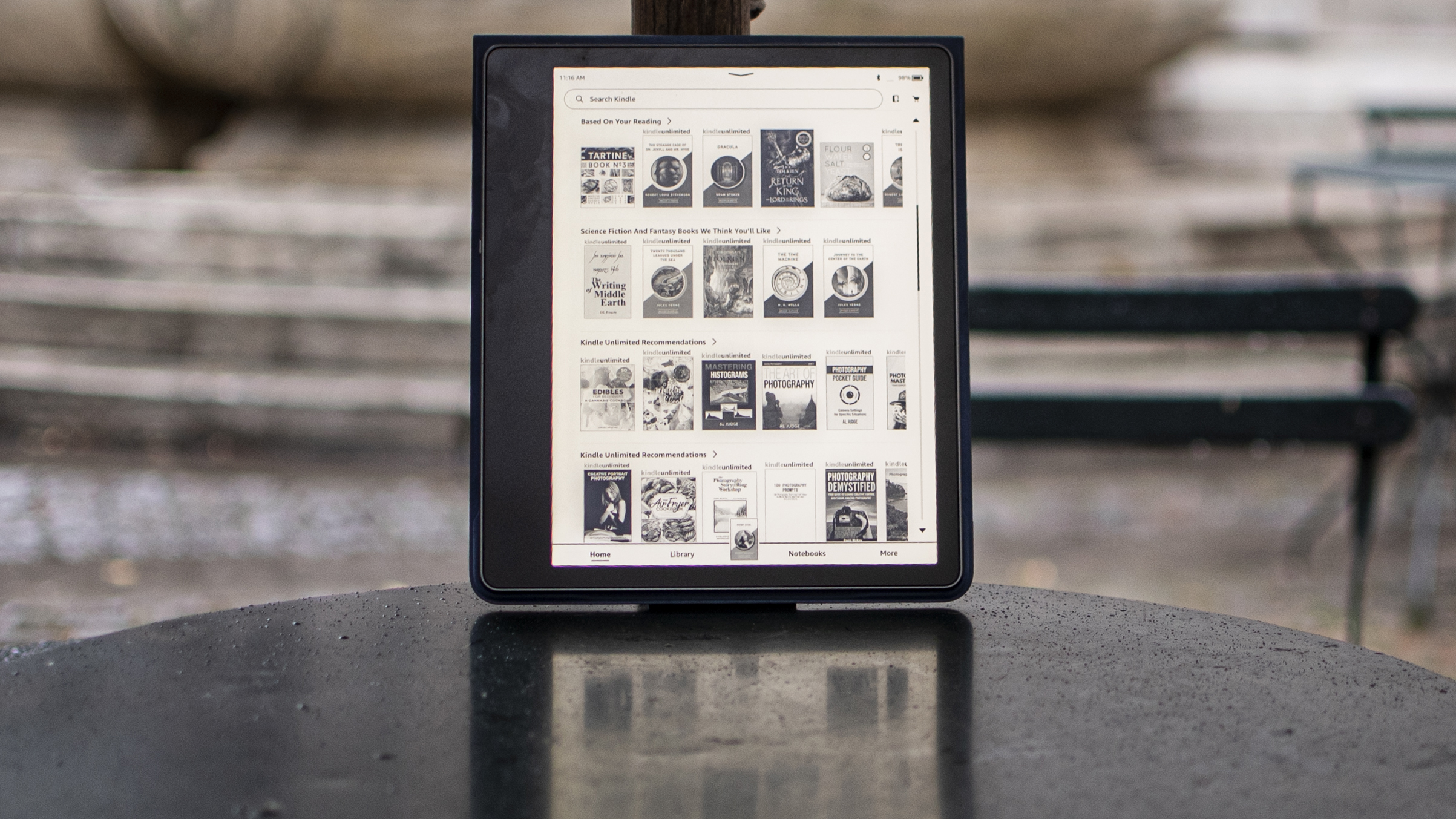
One-minute review
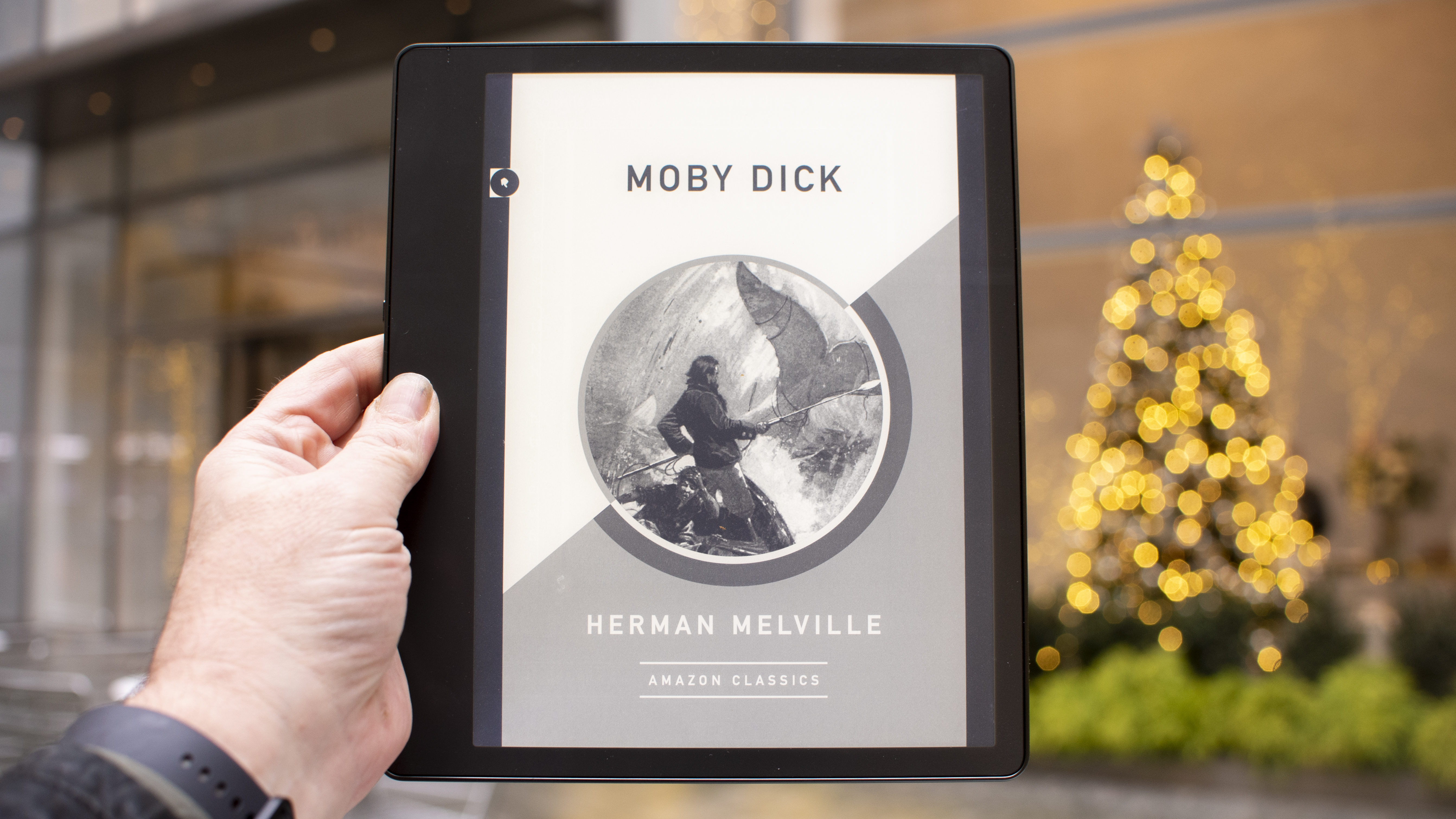
The Kindle Scribe has improved enough since it launched to become my preferred tablet to recommend if you like reading, journaling, and now maybe even old school pen and ink games like crossword puzzles and sudoku. It has the biggest screen you can find on a Kindle, while keeping the display just as sharp as the best Kindle ereaders, so books and text look amazing, even better than reading on the best iPad.
If you’re a hardcore handwriter and note-taker, you might prefer the Remarkable 2 tablet, which has many more options for pen styles, background templates, and productivity. The Kindle Scribe still has advantages, especially its backlight that lets you read and write in the dark, which the Remarkable can’t manage. The Kindle Scribe keeps things simpler, and this will work better for most people who aren’t using the writing tablet in the boardroom. The Scribe’s cost is also more consumer-friendly.
I originally complained that the Kindle Scribe couldn’t write in the margins of books, a feature I would love for students, as a former teacher. Sadly, this isn’t Amazon’s fault, and unless you buy books as .pdf files or more industry-specific .epub files, no writing tablet lets you write on any books as you please. Amazon does own a bookstore, so it has come up with a solution since the Kindle Scribe launched.
There are now ‘write on’ books in the Kindle store, and those let you write directly on the page on your Kindle Scribe. This turns out to be a game changer, because the selection, while small, is already unique and helpful. You get pre-filled journaling pages, some crossword and sudoku puzzles, and the promise of more to come. The possibilities are endless, and I’d love to see Amazon encourage some self-publishing in this ‘write on’ zone, to build Scribe adoption.
Kindle Scribe review: price and availability
- $339.99 / £339.99 / AU$549.99 for 16GB with basic pen
- Premium pen includes eraser and shortcut button
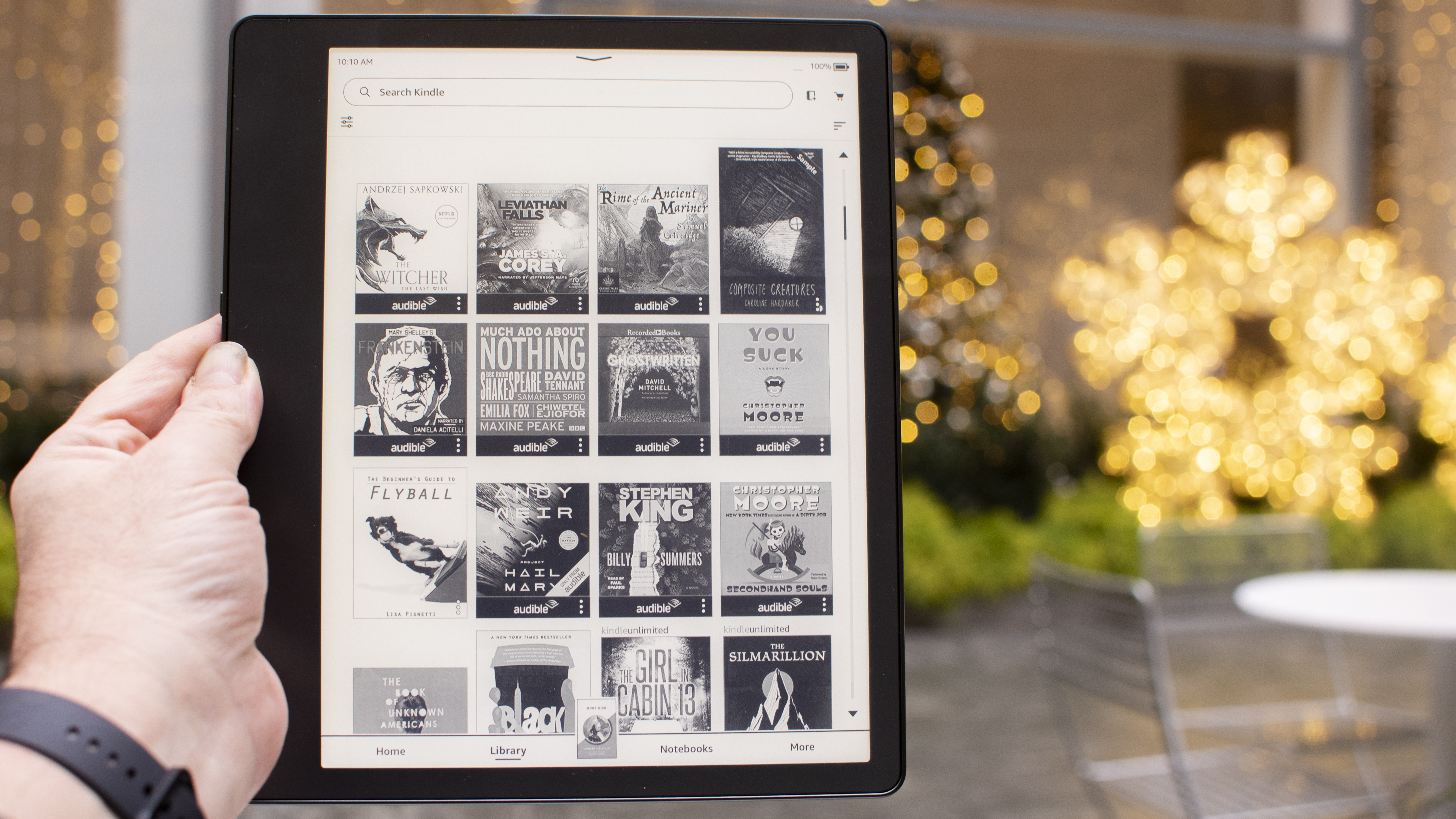
It’s hard to compare the pricing on tablets like the Kindle Scribe, considering different note-taking E Ink devices come with different feature sets. Overall, though, if you opt for the 16GB Kindle Scribe with the Basic Pen, there's decent value for what you get.
For example, the Kobo Elipsa comes in just one model that boasts 32GB of internal storage and ships with both the stylus and a sleepcover for $399.99 / £349.99 / AU$599.95 – so I'm inclined to say the Elipsa offers more value, but the writing experience isn't as smooth.
On the other hand, the reMarkable 2 costs a deceptive $299 / £299 / AU$499. I say deceptive because reMarkable doesn’t include a pen (which the Kindle Scribe and other writing tablets include) and charges exorbitant fees for accessories. The reMarkable also doesn’t have a backlight, so you need a light source to use it in the dark. It also cannot access the Kindle library, or any large eBook library easily.
Weight: 433g
Dimensions: 196 x 230 x 5.8mm
Display size: 10.2-inch
Storage: 16, 32, 64GB
Charging: USB-C charging
Backlight: LED (35 lights)
Pen Included: Yes
The Onyx Boox Note Air2 series isn't as widely available, but starts at $499 in the US for the base model. There are even more advanced E Ink tablets that use a pen, like the Onyx Boox Tab Ultra. That tablet is a more feature-packed device, and in its own class in terms of capability and price. It has a camera for document scanning and runs Android, for instance. For that reason, it’s almost twice the price of Amazon’s Kindle Scribe in the US.
Of course, let's not forget the iPad 10.2 (2021) which, incidentally only has a 264ppi resolution screen as compared to the Kindle Scribe's 300ppi e ink display, and prices start at $329 / £319 / AU$499 without a pen for 64GB of storage. Of course, comparing a colorful, extensible tablet like the iPad to the Kindle Scribe is like comparing apples to, er… Kindles.
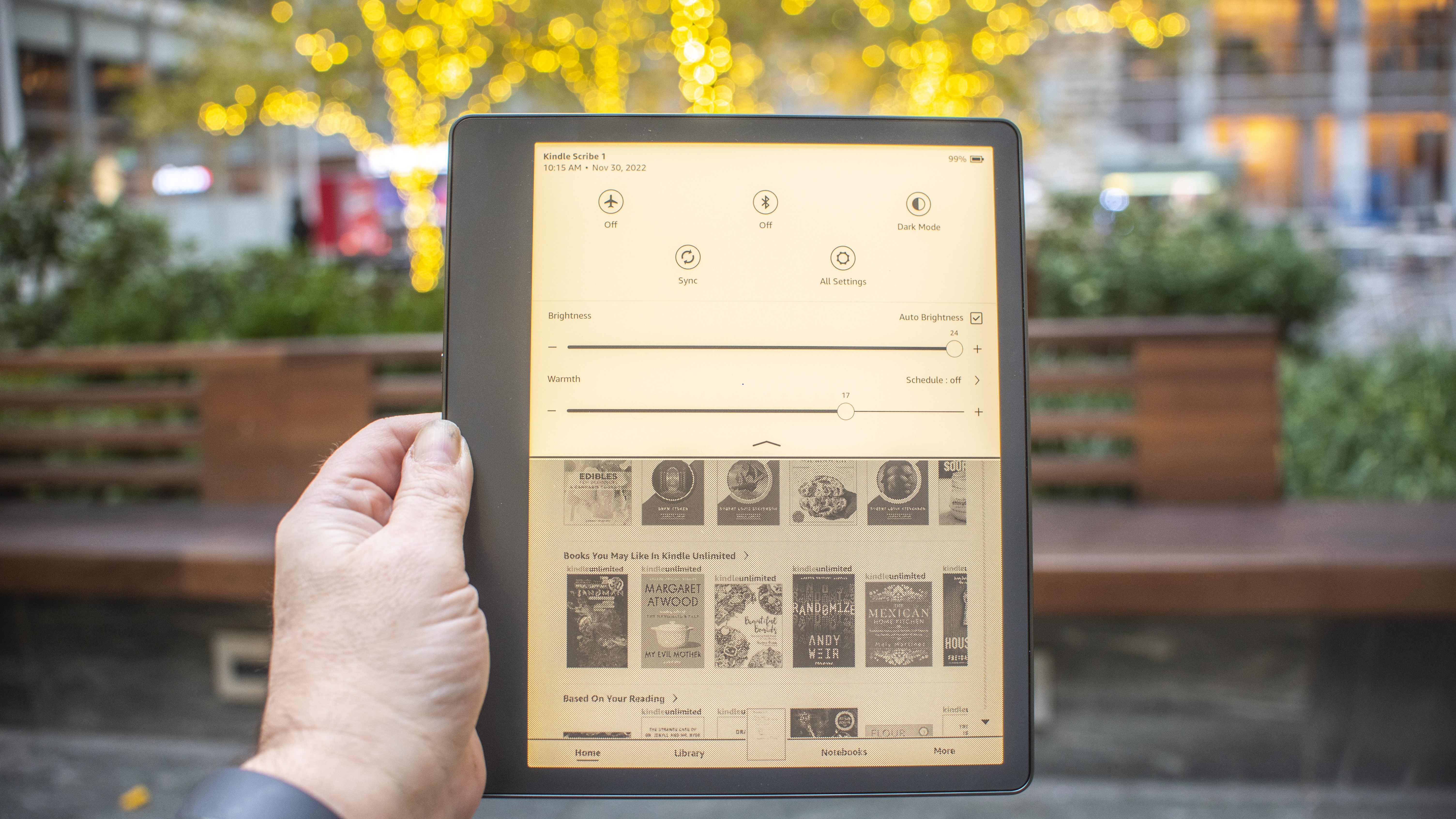
The more interesting price comparison is between the Kindle Scribe and other Kindle ereaders. The Scribe costs $90 / £110 / AU$150 more than the Kindle Oasis, which has only a 7-inch display, half the storage space, and no pen support. The only thing the Scribe cannot do is take a dip in the ocean, which the Kindle Oasis can legitimately handle, saltwater and all.
Kindle Scribe review: design
- Big and bright display doesn’t sacrifice sharpness
- Port and power are weirdly placed on the side
The Amazon Kindle Scribe looks like a much larger version of the Kindle Oasis, thanks to the all-metal chassis. Where it differs, other than the obvious size, is the missing page-turn buttons and the asymmetric thickness that I love on the Oasis.
The Kindle Scribe has rounded corners and smoothly curved edges with a wide, flat back, which interestingly has four tiny nubs for feet. It has a bezel all around, with a larger edge on the left side, if you hold the tablet Amazon smile-up. You can flip the Scribe and hold the larger edge with your right hand, but then the Amazon logo will be frowning.
The USB-C port for charging, as well as the power button are both strangely placed on the side of the device, near the middle, but this isn't unique to the Scribe and can be seen on the Onyx Boox Note series tablets too.
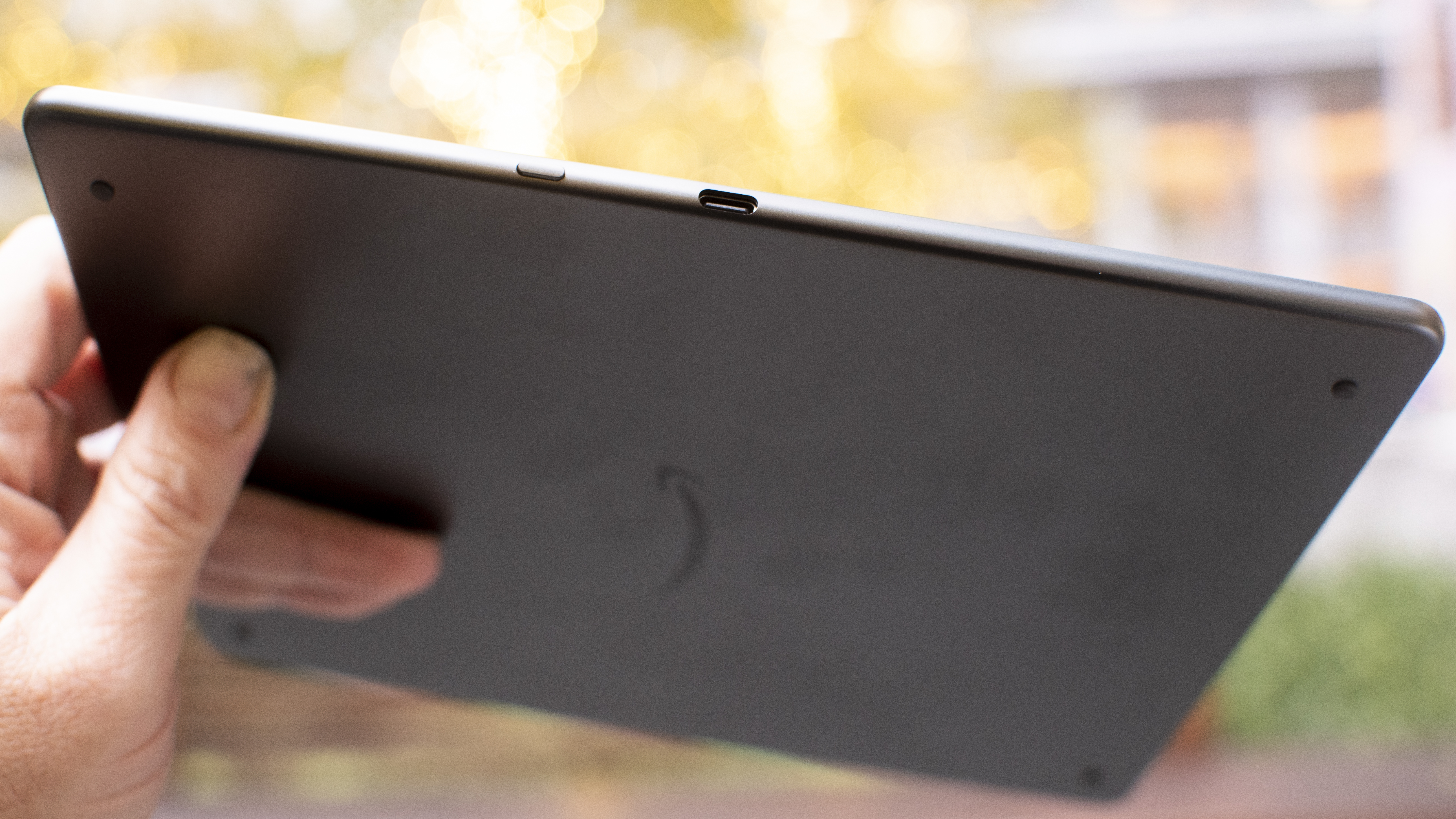
The pen, which is included, hangs on by a magnet on the opposite side edge of the Scribe. This is my least favorite way of holding a pen. The strongest rare earth magnets cannot keep a pen in place when I slide a tablet in and out of a backpack sleeve. I lost the Scribe pen on day one and spent a half hour searching before I found it. Thankfully, an old Galaxy Note pen works just as well in a pinch.
If you spring for the leather folio case – a nice addition that Amazon sent along with my review sample but you'll need to buy it separately – the flap opens up over the top like a reporter’s notebook, though much larger, similar to the sleepcover for the Kobo Elipsa (which ships with the tablet itself). The pen then slots into a holder on the edge of the flap.
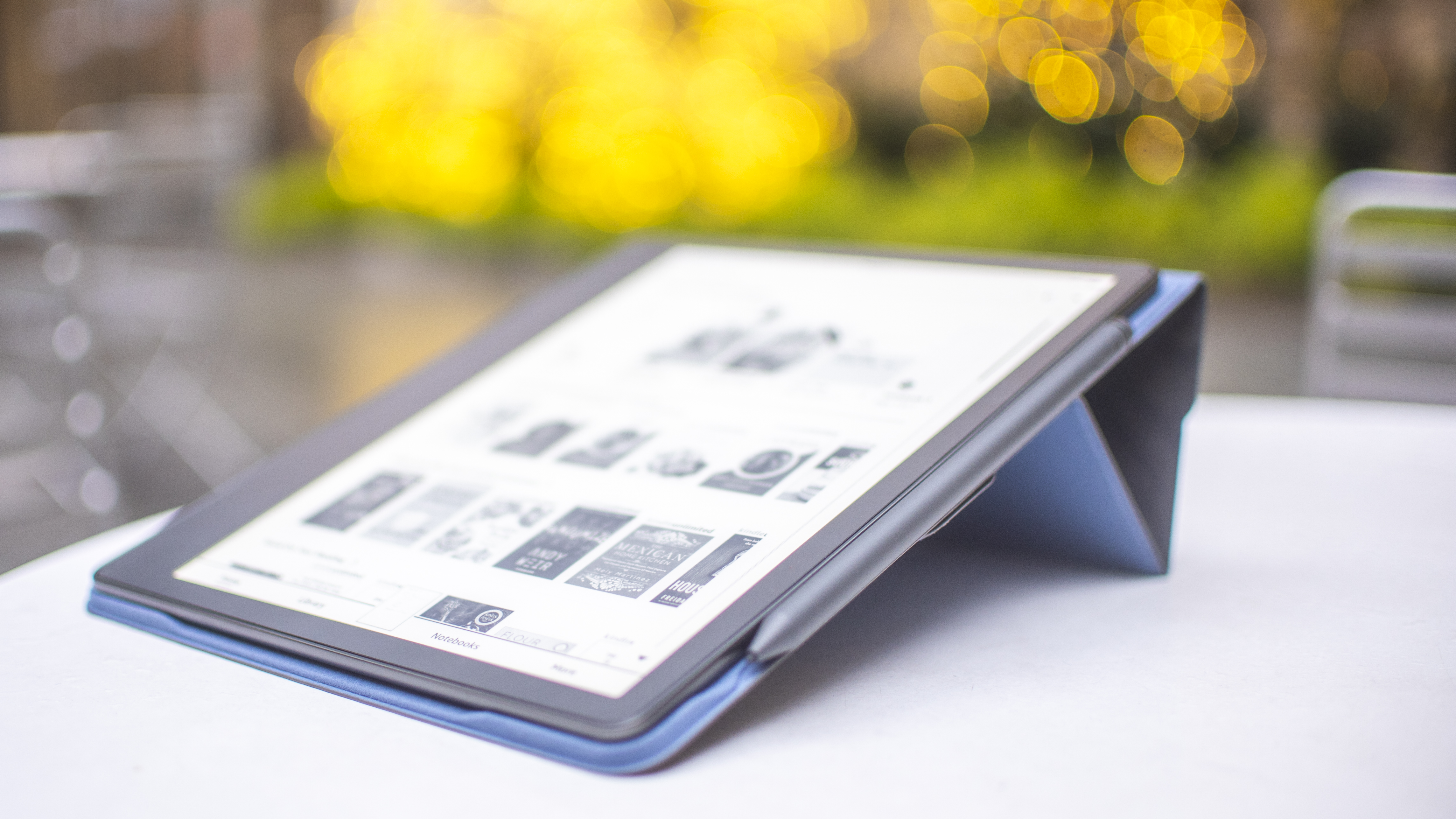
Compared to the competition, the Kindle Scribe is a bit thicker than the reMarkable 2 tablet – which makes sense because the reMarkable lacks a backlight – but is slimmer and sleeker-looking compared to the plastic body of the Kobo Elipsa. The Kindle has a very bright LED backlit screen, and it can switch from a bluish-gray tint to a blue light-free tint that’s better for nighttime reading.
The Kindle Scribe is also wider than the reMarkable and Elipsa, and less tall, but has identical overall dimensions as the Onyx Boox Note Air2 tablets. The screens are all roughly the same size, it’s just that the reMarkable puts its big bezel edge at the bottom instead of the side.
For reading, I found the Kindle very comfortable to hold and use, even for such a large tablet. I'd love to see it shed some weight, but it isn’t clumsy.
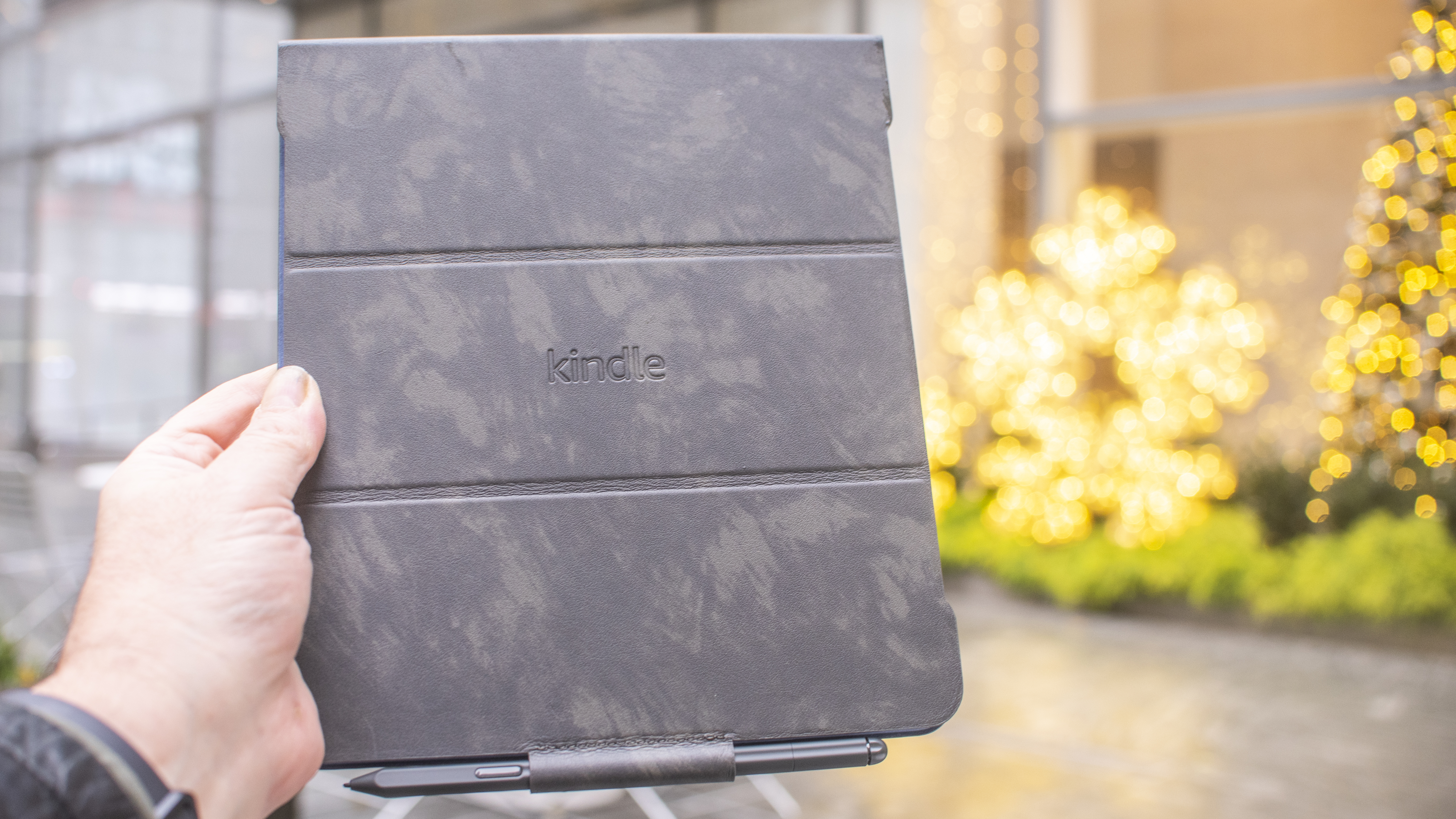
Kindle Scribe review: using it
- Excellent large screen Kindle for reading books
- Middling E Ink writing tablet for journaling and notes
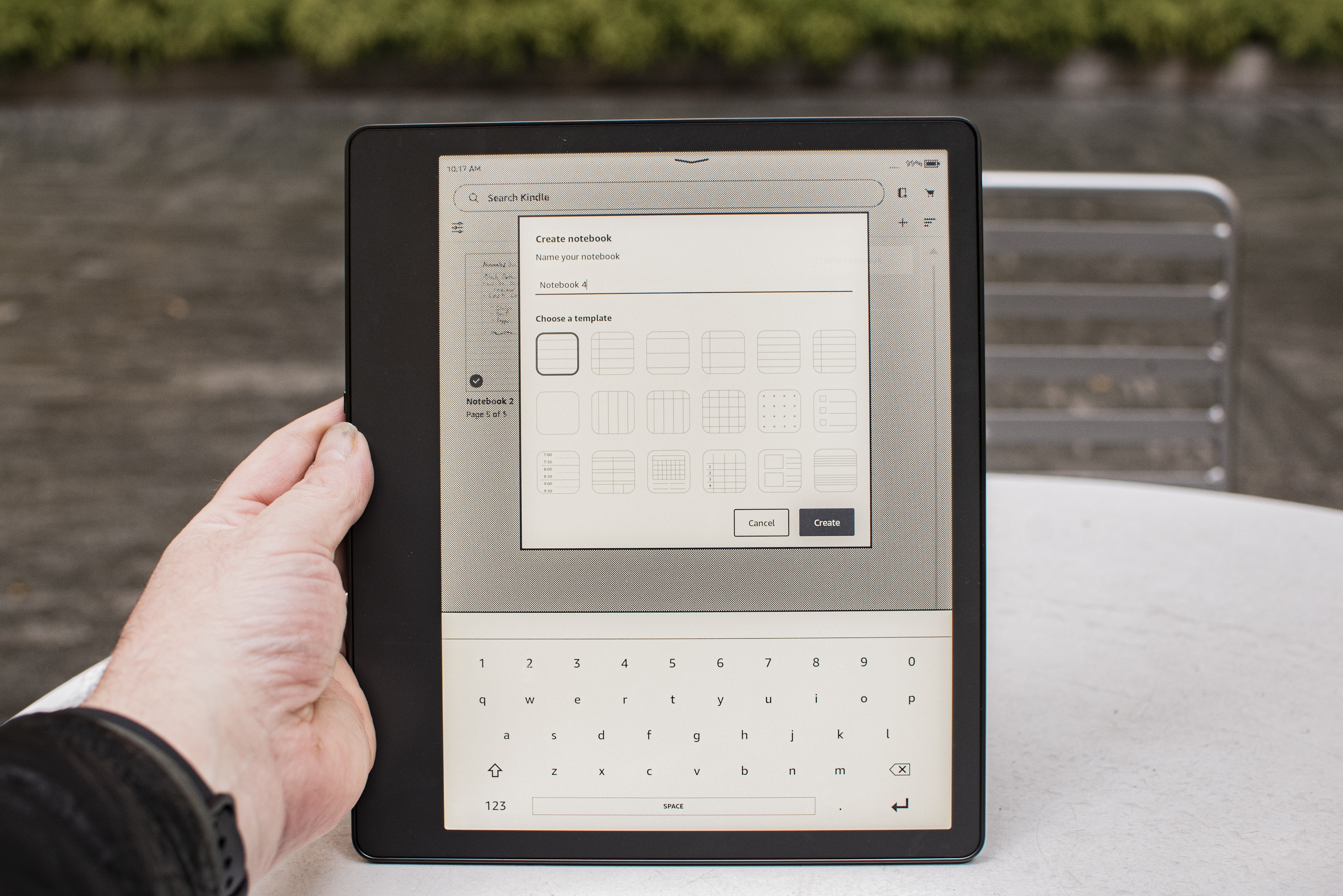
If you want to read books on a large-screen Kindle, the Scribe is an easy ereader to recommend, although the price is high for the category. Still, the screen is much larger than the next-biggest Kindle Oasis' 7-inch display and there's no sacrifice of the remarkable pixel density, so everything is super sharp and glorious on screen. If you’ve been craving a gigantic reading screen for bigger fonts and larger images, the Scribe is a joy to use.
On the other hand, if you’ve been excited about a Kindle that you can also use for journaling, note taking, and other writing tasks, the Kindle Scribe isn't the best tablet you can buy, but it does have plenty of writing features, and you can always buy more journaling books and templates from the Kindle store.
For students and academics, the Scribe only allows you to write notes as sticky notes appended to a book. You cannot actually write on the book page, in the margins, for instance. College students who buy their own books love the ability to interact directly with the text in writing, and it is a huge letdown that no current writing tablet can support this feature on every book you buy.
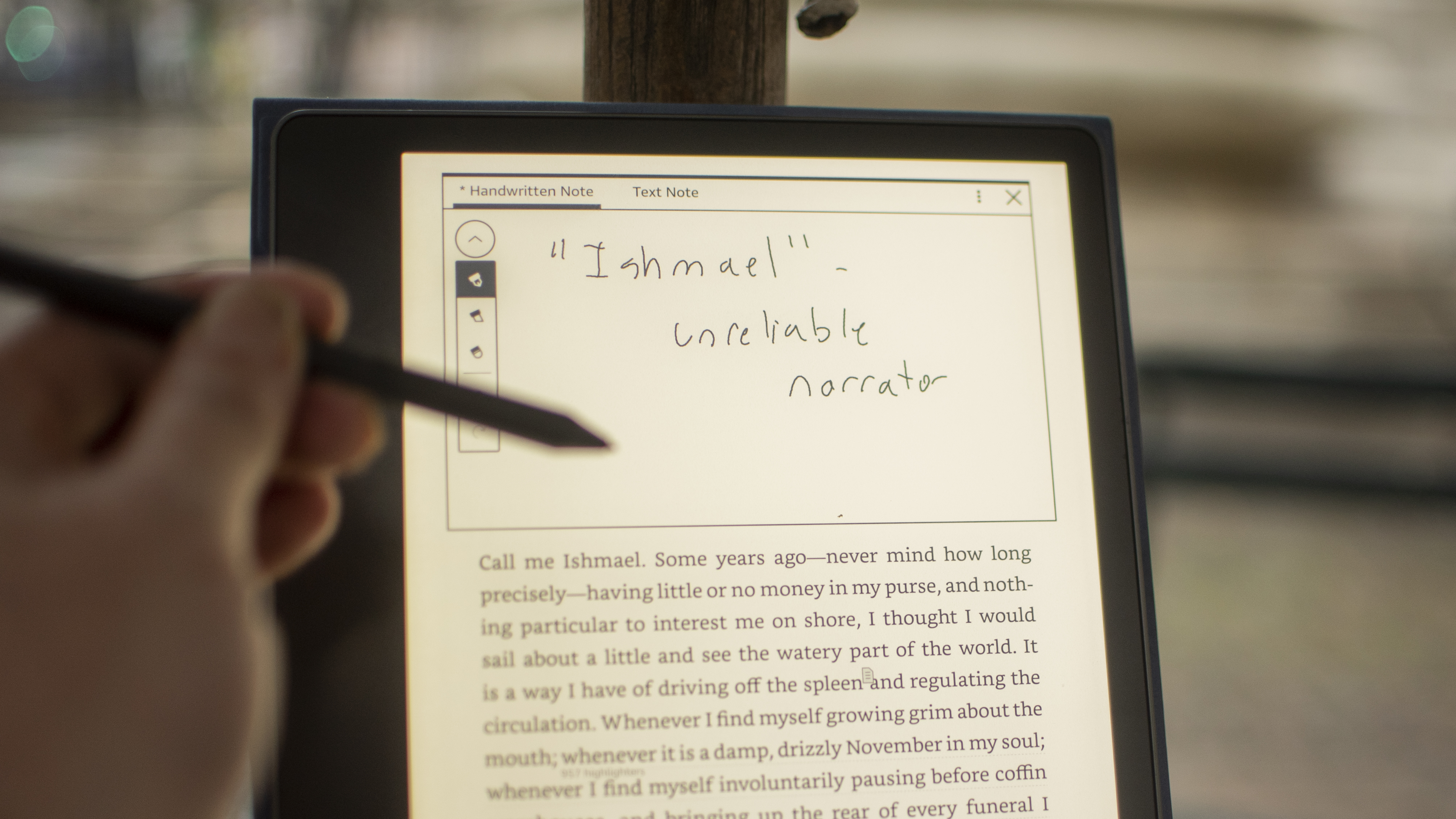
For journaling and freewriting, the Kindle Scribe offers few template options, and none that work well with popular journal methods. I use bullet journaling and found some basic dots and lined pages, but nothing as organized or creative as the templates I enjoy on the reMarkable 2 tablet. Even the Kobo Elipsa offers a lot more when it comes to note-taking, including adding formulae and diagrams in between notes. If you keep a journal or take detailed notes, I'm saying there are better options out there, and at a similar price point.
Since it launched, Amazon has added more pen options to the Kindle Scribe, including more styles and thickness levels. It isn't quite as robust as the reMarkable tablet, but it's a great improvement over the original offering. Hopefully we'll see even more options in future updates, but Amazon hasn't promised anything.
It isn’t difficult to use the Kindle Scribe for basic productivity. When I needed to sign a document, I simply sent it to a custom email address that I set up through my Amazon Kindle account. The PDF file arrived on my Scribe, and I could sign it and email it back with no trouble. But this will be difficult for anyone without a Kindle account. So, again, the Scribe is best served when you're embedded into the Amazon ecosystem. Even as an ereader, it's best used by customers already with existing Prime, Kindle Unlimited or Audible accounts.
The writing experience on the Scribe with even its Basic Pen is the best I've experienced to date. It is smooth as paper, and even that doesn't quite convey how good it really is to write on that screen.
Kindle Scribe review: connectivity
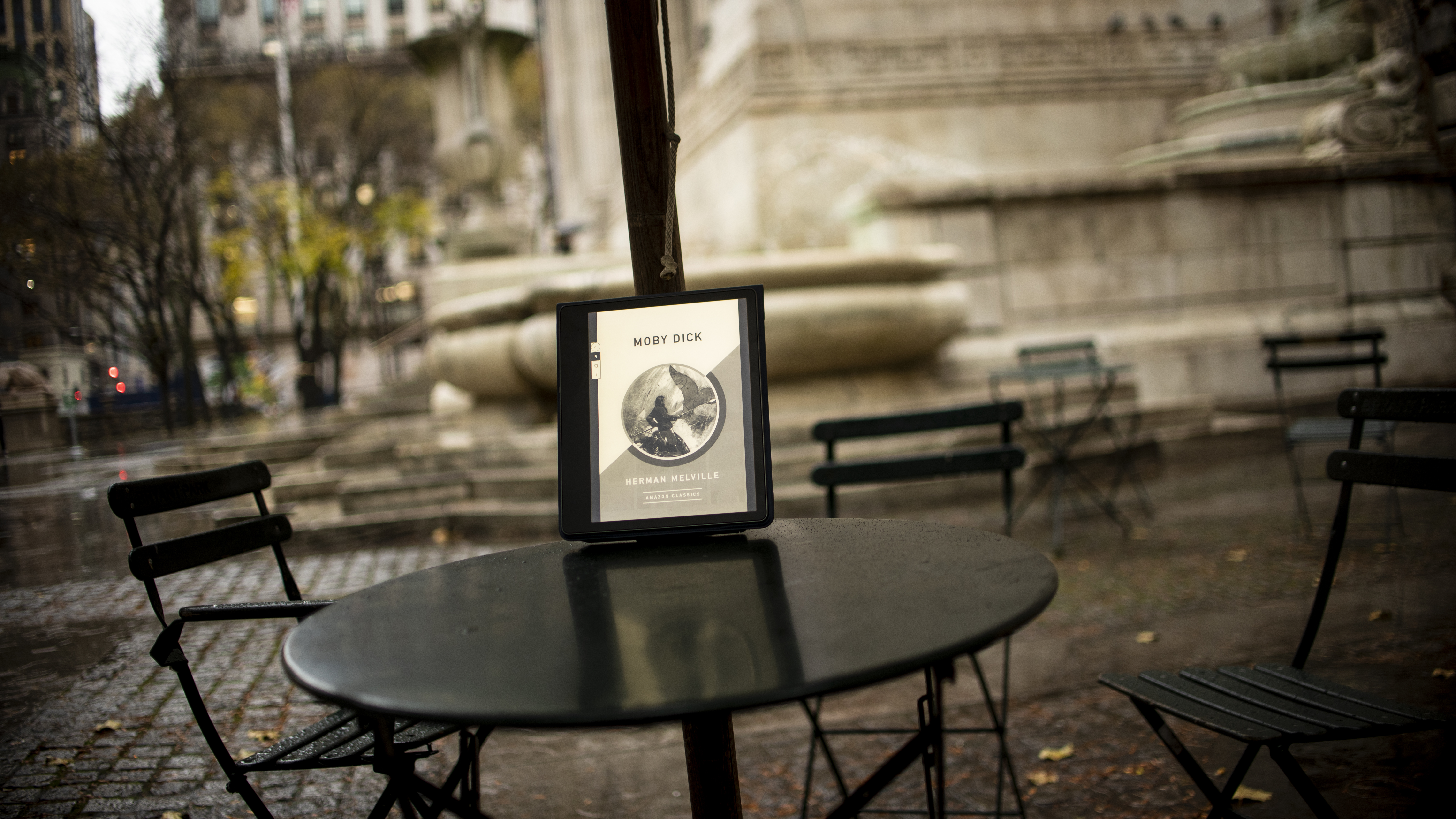
- Easy setup over Wi-Fi, no device needed
- Send documents to a dedicated email address
Amazon makes it easy to set up the Kindle Scribe and get all of your books and documents on and off the device. I had no trouble finding my Wi-Fi network, and the Kindle does not need a second device for setup. If you have a smartphone with the Kindle app, that helps speed the process along, but it isn’t required.
When I needed to sign documents with the Kindle Scribe, I found a dedicated email address @kindle.com was the easiest way. It is set up with a random username by default, but you can change this online, and I made it more convenient. As soon as I sent a document it appeared in my library, and I could email it from the Kindle Scribe to five recipients.
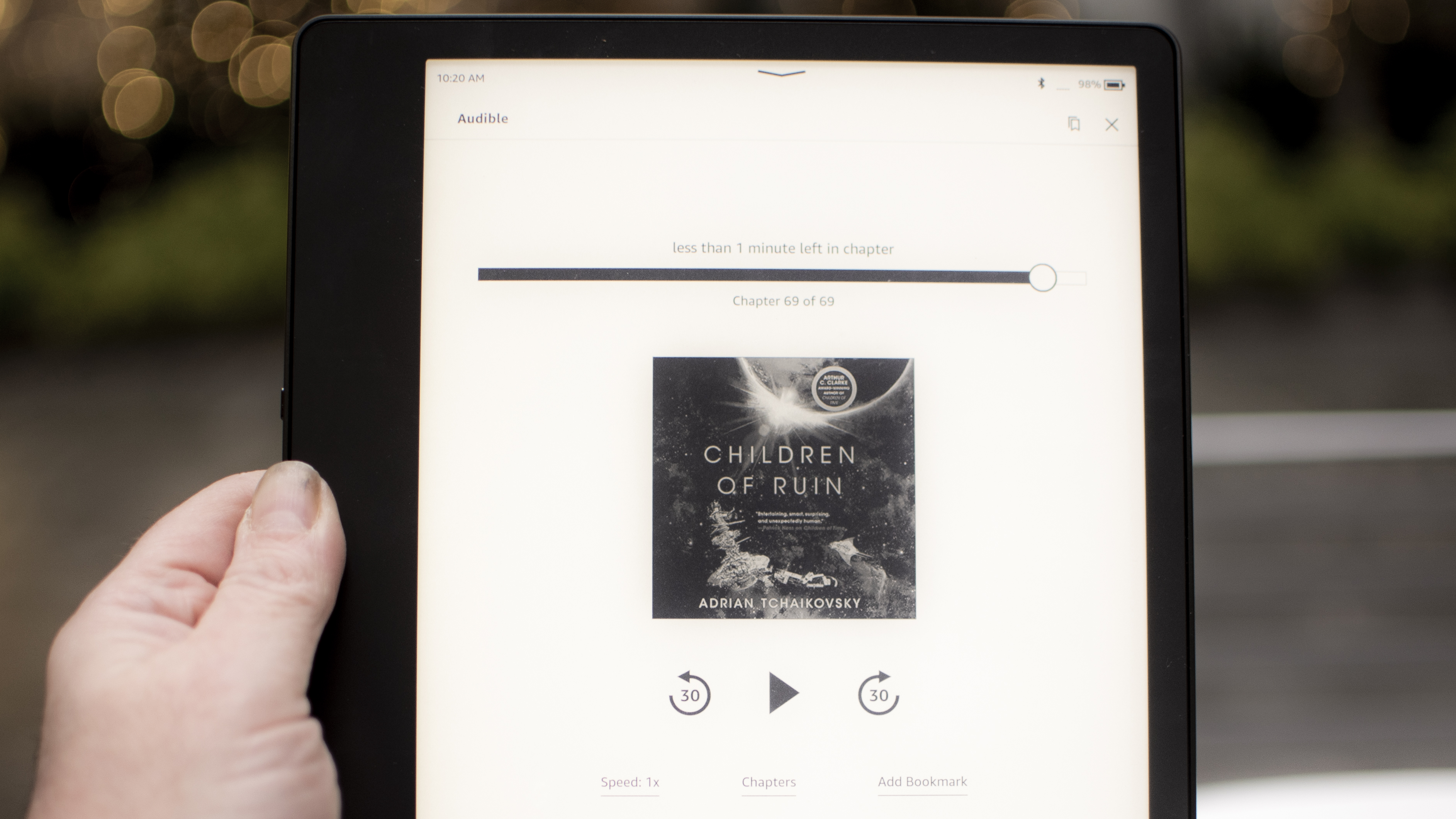
Of course, there are many more connectivity options I'd like to see, but at this price the options are fair. Some folks may want an LTE connection at least for downloading books or emailing simple black-and-white documents. Amazon sells a deluxe version of the Kindle Oasis with 4G LTE connectivity for downloads on the go, so it's a little strange to see the Scribe miss out... although I suspect the price for that privilege would be quite prohibitive for most potential users.
I could also imagine a microSD card slot being very useful for transferring and signing documents. If this were a more serious productivity tool, that would be a top request, but I've yet to see an alternative E Ink note-taking tablet offer this option.
Should I buy the Kindle Scribe?
Buy it if
Don't buy it if
Kindle Scribe review: also consider
If our Kindle Scribe review still has you on the fence then consider this trio of alternatives below:
- First reviewed: November 2022. Updated: July 2023.







